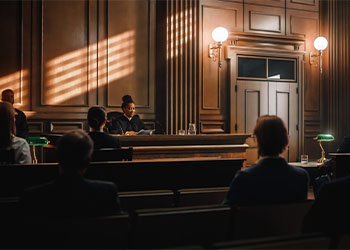Motions to Suppress: Getting Evidence Excluded
Jan. 16, 2023
 Physical evidence, witness statements, records, and other forms of evidence play a significant role in the outcome of every criminal case. However, in a situation where the evidence was obtained through unlawful means or while violating the person's rights, a defendant may be able to file a motion requesting the judge exclude such evidence from trial. A practiced Virginia criminal defense lawyer can educate you about filing motions to suppress evidence that is inadmissible in court.
Physical evidence, witness statements, records, and other forms of evidence play a significant role in the outcome of every criminal case. However, in a situation where the evidence was obtained through unlawful means or while violating the person's rights, a defendant may be able to file a motion requesting the judge exclude such evidence from trial. A practiced Virginia criminal defense lawyer can educate you about filing motions to suppress evidence that is inadmissible in court.
Bryan Jones has devoted his career to offering experienced legal services and helping clients achieve the most favorable outcome in their criminal cases. As your lawyer, I can review every aspect of your case and explore your options to exclude certain evidence from trial by filing a motion to suppress. Our firm proudly serves clients across Charlottesville, Waynesboro, and throughout Fluvanna, Albemarle, Greene, Nelson, and Louisa counties, Virginia.
What Is a Motion to Suppress?
A motion to suppress is a written request filed by an offender – prior to a criminal trial – asking the judge to exclude certain evidence from being presented by the prosecutor at trial. For instance, an alleged defendant can request the court to suppress a controlled substance that was obtained through unlawful search or seizure. According to the exclusionary rule, once a piece of evidence is suppressed, it may not be presented during trial.
Reasons You May Want a Motion to Suppress
Here are some common legal grounds or reasons to file a motion to suppress:
The evidence was obtained from an unlawful arrest or traffic stop.
The law enforcement officers obtained evidence or testimonies from the offender through Miranda rights violations.
The evidence was obtained through unlawful search or seizure.
The evidence was obtained through an unreasonable search done without a search warrant.
The police obtained the evidence with a defective or deficient search warrant.
The police violated the suspect's constitutional rights while getting the evidence.
There were flaws in the chain of custody of the evidence.
The police failed to follow strict procedural requirements for handling evidence.
If you believe that the police obtained the evidence illegally or is inadmissible in court and you want to file a motion to suppress, you should get in touch with a reliable criminal defense lawyer right away. Your attorney can educate you about the procedures to file a suppression motion in Virginia and help you navigate crucial decisions.
What Is the Process for Filing a Motion to Suppress?
To suppress evidence in the Commonwealth of Virginia, the defendant's legal counsel will file a formal motion to suppress or exclude the evidence from trial. Your attorney can help file the motion at the federal or state court, depending on where you are being arraigned.
Upon filing the motion, the court will schedule a hearing. At the suppression hearing, both parties would be allowed to present arguments supporting their case. The judge will hear the motion to suppress and testimonies from the defendant, witnesses, the arresting officer, and other parties, then make a decision.
If the court approves your motion to suppress, the judge will issue an order for such evidence to be excluded from trial. A strategic criminal defense lawyer can examine your specific situation, determine whether you have grounds to file a suppression motion, and walk you through the legal processes involved.
What Evidence Is Subject to Exclusion?
Depending on the circumstances surrounding your case, you may be able to file a motion to exclude any of these pieces of evidence.
Written statements
Audio recordings
Witness testimony
Confessions
Financial records
Statements from an illegal wiretap
Pictures
Breathalyzer results (BAC level)
Drugs
Blood or urine test results indicate the presence of illicit drugs.
A trusted attorney can analyze your case diligently and help decide if such evidence may be subject to exclusion.
Seek an Experienced Defense Attorney
Any piece of evidence obtained during a criminal arrest or investigation can have a massive impact on the outcome of your criminal case. In the event that such evidence was obtained unlawfully, through Miranda rights violations, or not properly handled, you may file a motion to suppress or exclude it from trial. At Bryan J. Jones, LLC, we're dedicated to offering comprehensive legal guidance and skilled representation to clients in their criminal cases.
As your legal counsel, we can evaluate and investigate all of the facts of your case and determine the admissibility of the available evidence at trial. In addition, we will analyze how the evidence was obtained and file a motion to suppress any evidence obtained illegally. Above all, our attorney will continue fighting to uphold your freedom and attempt to get the charges against you dropped or ultimately dismissed.
Are you facing criminal charges? Contact Bryan J. Jones, LLC, today to schedule a simple case assessment with a strategic criminal defense lawyer. Our trusted team can explore all of your defense options and determine the possibility of suppressing the evidence against you. We're proud to serve clients across Charlottesville, Waynesboro, and throughout Fluvanna, Albemarle, Greene, Nelson, and Louisa counties, Virginia.

